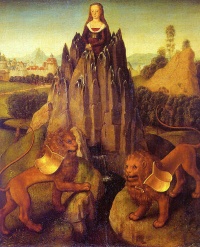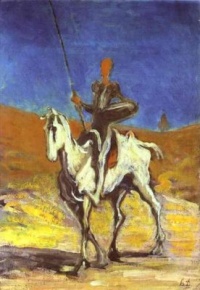Honour
From The Art and Popular Culture Encyclopedia
| Revision as of 17:27, 23 June 2022 Jahsonic (Talk | contribs) ← Previous diff |
Current revision Jahsonic (Talk | contribs) |
||
| Line 1: | Line 1: | ||
| + | [[Image:Allegory of Chastity by Memling.jpg|thumb|200px|''[[Allegory of Chastity (Hans Memling)|Allegory of Chastity]]'' (1475) by Hans Memling]] | ||
| {| class="toccolours" style="float: left; margin-left: 1em; margin-right: 2em; font-size: 85%; background:#c6dbf7; color:black; width:30em; max-width: 40%;" cellspacing="5" | {| class="toccolours" style="float: left; margin-left: 1em; margin-right: 2em; font-size: 85%; background:#c6dbf7; color:black; width:30em; max-width: 40%;" cellspacing="5" | ||
| | style="text-align: left;" | | | style="text-align: left;" | | ||
| "[[Honor is an old saint past praying to]]"--Mathurin Régnier | "[[Honor is an old saint past praying to]]"--Mathurin Régnier | ||
| + | <hr> | ||
| + | “How little thou knowest about [[chivalry]], [[Sancho Panza |Sancho]],” replied [[Don Quixote]]; “hold thy peace and have patience; the day will come when thou shalt see with thine own eyes what an [[honour]]able thing it is to wander in the pursuit of this calling.”--''[[Don Quixote]]'' (1605) by Miguel de Cervantes | ||
| |} | |} | ||
| + | [[Image:Don Quixote and Sancho Pansa by Honoré Daumier.jpg|thumb|200px|right|''[[Don Quixote]]'' (c. 1868) by Honoré Daumier]] | ||
| {{Template}} | {{Template}} | ||
| - | '''Honour''' ([[British English]]), or '''honor''' ([[American English]]), is the evaluation of a person’s [[trustworthiness]] and social [[social status|status]] based on that individual's espousals and actions. Honour is deemed exactly what determines a person's character: whether or not the person reflects [[honesty]], [[respect]], [[integrity]], or fairness. Accordingly, [[individual]]s are assigned worth and stature based on the harmony of their actions, ''[[honor code|code of honour]]'', and that of the [[society]] at large. Honour can be analysed as a [[moral relativism|relativistic]] concept, i.e., conflicts between individuals and even cultures arising as a consequence of material circumstance and ambition, rather than fundamental differences in principle. Alternatively, it can be viewed as [[nativism|nativist]] — that honour is as real to the human condition as [[love]], and likewise derives from the formative personal bonds that establish one's personal [[dignity]] and [[Moral character|character]]. | ||
| - | [[Samuel Johnson|Dr Samuel Johnson]], in his ''[[A Dictionary of the English Language]]'' (1755), defined honour as having several senses, the first of which was ''"[[nobility]] of [[soul]], [[magnanimity]], and a scorn of meanness."'' | + | '''Honour''' is the [[idea]] of a [[bond]] between an [[individual]] and a [[society]] as a [[quality]] of a person that is both of social teaching and of personal [[ethos]], that manifests itself as a [[code of conduct]], and has various elements such as [[valour]], [[chivalry]], [[honesty]], and [[compassion]]. It is an abstract concept entailing a perceived quality of [[worthiness]] and [[respectability]] that affects both the [[social standing]] and the [[self-evaluation]] of an individual or institution such as a family, school, regiment or nation. Accordingly, individuals (or institutions) are assigned [[worth]] and stature based on the harmony of their actions with a specific [[code of conduct|code of honour]], and the [[moral code]] of the society at large. |
| - | This sort of honour derives from the perceived [[virtue|virtuous]] conduct and personal integrity of the person endowed with it. On the other hand, Johnson also defined honour in relationship to "[[reputation]]" and "[[fame]]"; to "privileges of rank or birth", and as "respect" of the kind which ''"places an individual socially and determines his right to precedence."'' This sort of honour is not so much a function of moral or ethical excellence, as it is a consequence of power. Finally, with respect to [[women]], ''honour'' may be synonymous with "[[chastity]]" or "[[virginity]]". | + | |
| - | ==Wiktionary== | + | [[Samuel Johnson]], in his ''[[A Dictionary of the English Language]]'' (1755), defined honour as having several senses, the first of which was "[[nobility]] of soul, [[magnanimity]], and a scorn of [[meanness]]". |
| - | # An [[objectification]] of [[praise]]worthiness, [[respect]]. (I.e., something that represents praiseworthiness, respect.) | + | |
| + | This sort of honour derives from the perceived virtuous conduct and personal [[integrity]] of the person endowed with it. On the other hand, Johnson also defined honour in relationship to "reputation" and "fame"; to "privileges of rank or birth", and as "respect" of the kind which "places an individual socially and determines his right to precedence". This sort of honour is often not so much a function of moral or ethical excellence, as it is a consequence of power. Finally, with respect to [[sexuality]], ''honour'' has traditionally been associated with (or identical to) "[[chastity]]" or "[[virginity]]", or in case of married men and women, "fidelity". Some have argued that honour should be seen more as a rhetoric, or set of possible actions, than as a code. | ||
| + | |||
| + | ==Dishonour== | ||
| + | # [[shame]] or [[disgrace]] | ||
| + | # a [[lack]] of [[honor]] or [[integrity]] | ||
| == See also == | == See also == | ||
Current revision

|
"Honor is an old saint past praying to"--Mathurin Régnier “How little thou knowest about chivalry, Sancho,” replied Don Quixote; “hold thy peace and have patience; the day will come when thou shalt see with thine own eyes what an honourable thing it is to wander in the pursuit of this calling.”--Don Quixote (1605) by Miguel de Cervantes |

|
Related e |
|
Featured: |
Honour is the idea of a bond between an individual and a society as a quality of a person that is both of social teaching and of personal ethos, that manifests itself as a code of conduct, and has various elements such as valour, chivalry, honesty, and compassion. It is an abstract concept entailing a perceived quality of worthiness and respectability that affects both the social standing and the self-evaluation of an individual or institution such as a family, school, regiment or nation. Accordingly, individuals (or institutions) are assigned worth and stature based on the harmony of their actions with a specific code of honour, and the moral code of the society at large.
Samuel Johnson, in his A Dictionary of the English Language (1755), defined honour as having several senses, the first of which was "nobility of soul, magnanimity, and a scorn of meanness".
This sort of honour derives from the perceived virtuous conduct and personal integrity of the person endowed with it. On the other hand, Johnson also defined honour in relationship to "reputation" and "fame"; to "privileges of rank or birth", and as "respect" of the kind which "places an individual socially and determines his right to precedence". This sort of honour is often not so much a function of moral or ethical excellence, as it is a consequence of power. Finally, with respect to sexuality, honour has traditionally been associated with (or identical to) "chastity" or "virginity", or in case of married men and women, "fidelity". Some have argued that honour should be seen more as a rhetoric, or set of possible actions, than as a code.
Dishonour
See also
- Bushido
- Chivalry
- Code duello
- Culture of honor (Southern United States)
- Dignitas (Roman concept)
- Ethos
- Feud
- Honorary degree
- Honor killing
- Honour system
- Izzat (Honor)
- Moka exchange
- Omertà
- Order (distinction)
- Pashtunwali
- Personal rights
- Personality rights
- Potlatch
- The Lost Honour of Katharina Blum
- Youxia

